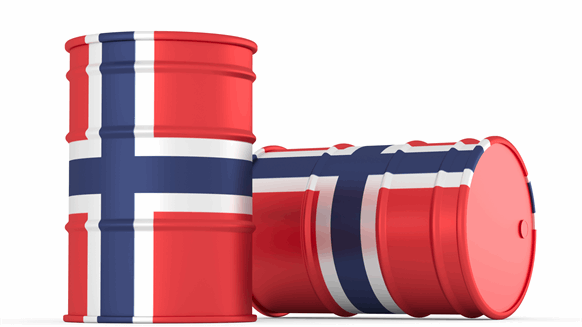Aker BP has received approval from Norway’s legislature to proceed with development projects in the North Sea that have about 1.07 billion barrels of oil equivalent (Bboe) in combined reserves.
The green light paves the way for final approval by the Ministry of Petroleum and Energy of development plans for the Yggdrasil area and the Valhall field extension project, Aker BP said in a statement press monday
The independent exploration and production company previously announced a Yggdrasil discovery that brings the area’s reserves to more than 700 million boe (MMboe). Estimated to add 40-90 MMboe, the Ost Frigg Beta/Epsilon exploration well was nearing completion of drilling, Aker BP said on May 25 announcing the discovery.
Meanwhile, the Valhall PWP-Fenris extension project would add about 230 MMboe to Valhall’s existing reserves of roughly 137 MMboe, Monday’s announcement said.
The Yggdrasil and Valhall PWP-Fenris projects are both in the detailed engineering stage, according to the media release.
Aker BP plans to start construction on Yggdrasil in the fall. Senior vice president Yggdrasil Lars Høier said in the statement that “all major contracts” had been signed and thousands of orders had been placed by domestic and international buyers.
“Yggdrasil is the next major development on the Norwegian platform, and together with partners Equinor and PGNIG Upstream Norway, we are now opening up a mature area in the North Sea,” said Høier.
Valhall PWP-Fenris is ready to start construction before the summer as planned, the company said. The Fenris field, which through the Valhall PWP-Fenris project will be connected to the Valhall field by a bridge, is being developed with PGNiG Upstream Norway AS, while Pandion Energy AS is Valhall’s partner.
CEO Johnny Hersvik commented: “Yggdrasil and Valhall PWP-Fenris alone constitute more than NOK 165 billion in investments. We are talking about an estimated tax revenue of more than NOK 120 billion for our nation.”
Norway will also receive around 65 percent of Yggdrasil and Valhall PWP-Fenris deliveries, which have a combined contribution of “130,000 full-time equivalents in Norway over the life of the fields,” said Aker BP, which is listed on Oslo.
Gas for Europe
The Valhall expansion project aims to boost gas exports to Europe.
“Now we are also establishing Valhall as a gas hub. Fenris production will substantially increase Valhall’s gas export to Europe and more than double gas processing capacity,” said Valhall Senior Vice President Ole Johan Molvig .
Norway had been Europe’s second largest source of natural gas after Russia before the latter invaded Ukraine last year. EU and UK imports from the Nordic country averaged nine billion cubic feet per day (Bcf/d) between 2010 and 2020, below Russia’s 2020 average of 13 Bcf/d d “as the development of new fields in the Barents Sea section. from the Norwegian continental shelf was not enough to offset declines in mature fields in the North Sea,” the US Energy Information Administration said in a report on February 11, 2022.
Amid President Vladimir Putin’s war-fighting trade sanctions, Norway overtook Russia as the EU’s top natural gas exporter in 2022, accounting for 24.4% of the region’s imports compared to 15.3% from Russia, according to a bulletin updated on May 3 by the EU statistics agency Eurostat.
Climate Debacle
The Yggdrasil and Valhall PWP-Fenris projects had been approved in parliament by the government and approved on May 25 by a majority of lawmakers on the Standing Committee on Energy and Environment, Aker BP said in Monday’s announcement.
Although considered a leader in climate action, Norway has faced criticism for its continued development of fossil fuels.
Last month, the Ministry of Petroleum and Energy opened the latest round of licenses for oil production on the country’s continental shelf, with an option for the state’s participation in project rights. “At the time of the award, the participation of the State in each production license may be stipulated. Petoro AS is the holder of the license on behalf of the State’s participation (State Direct Financial Interest – SDFI),” said the call for applications published on May 11.
In 2020, the Supreme Court ruled against a lawsuit by environmental and youth organizations to stop new oil drilling in the Arctic.
“It is absurd that our right to a livable environment cannot be used to stop Norway’s most harmful activities for our climate and our environment,” said Frode Pleym, head of the lawsuit co-initiating Greenpeace Norway. in a statement from the watchdog on December 22, 2020. .
David Boyd, the United Nations special rapporteur on environment and human rights, had called on Norway to end the exploration of oil and gas reserves and the expansion of hydrocarbon infrastructure.
“The Norwegian paradox is that its leadership in some aspects of climate action is undermined by its continued dependence on a large fossil fuel industry,” Boyd wrote in The Guardian on November 12, 2019 after an official visit to Norway.
“Norway, as one of the richest nations in the world and a major producer of oil and gas, has a responsibility to lead efforts to mitigate, adapt and, at least to some extent, compensate for the loss and damage caused by these products”.
Aker BP stated that the Fenris and Yggdrasil fields are low emission projects. “The development projects contribute to Aker BP’s ambition to create the oil and gas company of the future with low costs, low emissions, profitable growth and attractive returns,” he said in the announcement on Monday.
To contact the author, please email jov.onsat@rigzone.com


